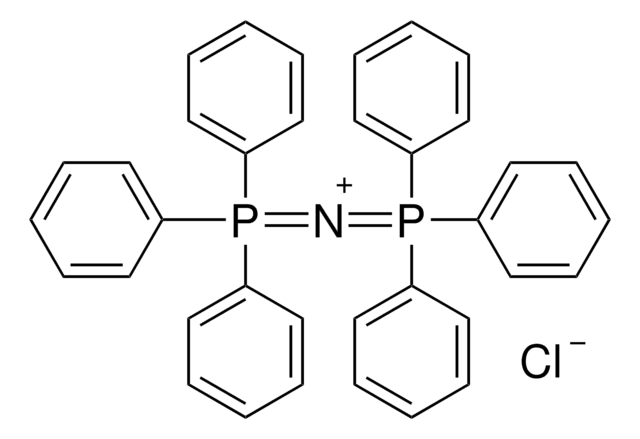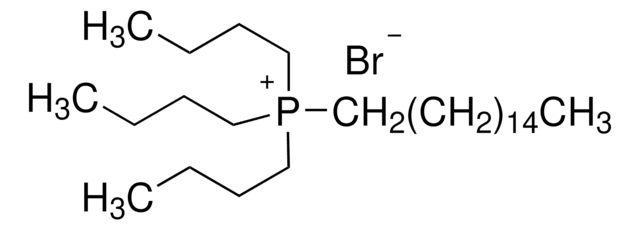218790
Tetraphenylphosphonium chloride
98%
Synonym(s):
Chlorotetraphenylphosphorane
Sign Into View Organizational & Contract Pricing
All Photos(1)
About This Item
Linear Formula:
(C6H5)4P(Cl)
CAS Number:
Molecular Weight:
374.84
Beilstein:
3922393
EC Number:
MDL number:
UNSPSC Code:
12352002
PubChem Substance ID:
NACRES:
NA.22
Recommended Products
Quality Level
Assay
98%
form
solid
mp
272-274 °C (lit.)
SMILES string
[Cl-].c1ccc(cc1)[P+](c2ccccc2)(c3ccccc3)c4ccccc4
InChI
1S/C24H20P.ClH/c1-5-13-21(14-6-1)25(22-15-7-2-8-16-22,23-17-9-3-10-18-23)24-19-11-4-12-20-24;/h1-20H;1H/q+1;/p-1
InChI key
WAGFXJQAIZNSEQ-UHFFFAOYSA-M
Looking for similar products? Visit Product Comparison Guide
Application
- Tetraphenylphosphonium chloride can be used to tune the crystallinity of CH3NH3PbI3 thin film during the deposition for boosting perovskite solar cells (PSCs) device performance.
- It reacts with organometallic anionic complexes to give the corresponding salts.
- It can also be used as arylating reagents in Pd-catalyzed Heck reaction.
Storage Class Code
11 - Combustible Solids
WGK
WGK 3
Flash Point(F)
Not applicable
Flash Point(C)
Not applicable
Personal Protective Equipment
dust mask type N95 (US), Eyeshields, Gloves
Choose from one of the most recent versions:
Already Own This Product?
Find documentation for the products that you have recently purchased in the Document Library.
Oxoperoxo molybdenum (vi) and tungsten (vi) and oxodiperoxo molybdate (vi) and tungstate (vi) complexes with 8-quinolinol: synthesis, structure and catalytic activity.
Maiti S K, et al.
New. J. Chem., 29(4), 554-563 (2005)
Tetraarylphosphonium Halides as Arylating Reagents in Pd?Catalyzed Heck and Cross?Coupling Reactions.
Hwang L K, et al.
Angewandte Chemie (International Edition in English), 44(38), 6166-6169 (2005)
Efficient Perovskite Solar Cells with Reduced Photocurrent Hysteresis through Tuned Crystallinity of Hybrid Perovskite Thin Films.
Qi J, et al.
ACS Omega, 3(6), 7069-7076 (2018)
Denice C Bay et al.
Biochimica et biophysica acta, 1798(3), 526-535 (2009-12-29)
Escherichia coli multidrug resistance protein E (EmrE) is a four transmembrane alpha-helix protein, and a member of the small multidrug resistance protein family that confers resistance to a broad range of quaternary cation compounds (QCC) via proton motive force. The
Yang Zhou et al.
Bioconjugate chemistry, 22(8), 1459-1472 (2011-06-24)
Alteration in mitochondrial transmembrane potential (ΔΨ(m)) is an important characteristic of cancer. The observation that the enhanced negative mitochondrial potential is prevalent in tumor cell phenotype provides a conceptual basis for development of mitochondrion-targeting therapeutic drugs and molecular imaging probes.
Our team of scientists has experience in all areas of research including Life Science, Material Science, Chemical Synthesis, Chromatography, Analytical and many others.
Contact Technical Service


![Sodium tetrakis[3,5-bis(trifluoromethyl)phenyl]borate](/deepweb/assets/sigmaaldrich/product/structures/251/439/7a621e74-bfd1-4a43-833c-09adfcc1e0b3/640/7a621e74-bfd1-4a43-833c-09adfcc1e0b3.png)





